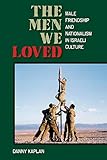The Men We Loved : Male Friendship and Nationalism in Israeli Culture / Danny Kaplan.
Material type: TextPublisher: New York ; Oxford : Berghahn Books, [2006]Copyright date: ©2006Description: 1 online resource (190 p.)Content type:
TextPublisher: New York ; Oxford : Berghahn Books, [2006]Copyright date: ©2006Description: 1 online resource (190 p.)Content type: - 9781845451936
- 9781782389378
- 302.3/4081095694 22
- HQ1090.7.I75
- online - DeGruyter
| Item type | Current library | Call number | URL | Status | Notes | Barcode | |
|---|---|---|---|---|---|---|---|
 eBook
eBook
|
Biblioteca "Angelicum" Pont. Univ. S.Tommaso d'Aquino Nuvola online | online - DeGruyter (Browse shelf(Opens below)) | Online access | Not for loan (Accesso limitato) | Accesso per gli utenti autorizzati / Access for authorized users | (dgr)9781782389378 |
Frontmatter -- CONTENTS -- Acknowledgments -- Prologue -- Part I: Friendship and Ideology -- Introduction -- Chapter 1: The Case of Fraternal Friendship -- Chapter 2: Re’ut: Friendship in Zionist Ideology -- Part II: Friendship in Everyday Life -- Introduction -- Chapter 3: History and Destiny: Friendship Narratives -- Chapter 4: Two Styles of Sharing: The Hevreman and the Intellectual -- Chapter 5: Public Intimacy and the Miscommunication of Desire -- Part III: Sacred Friendship -- Introduction -- Chapter 6: David, Jonathan, and Other Soldiers: The Hegemonic Script for Male Bonding -- Chapter 7: “Shalom, haver”: Commemoration as Desire -- Discussion: Nationalism, Friendship, and Commemorative Desire -- Appendix I: Studying a National Emotion -- Appendix II: Table of Interviewees -- Bibliography -- INDEX
restricted access online access with authorization star
http://purl.org/coar/access_right/c_16ec
Some semi-public, exclusive male settings, most noticeably in the military, encourage the production of intimacy and desire. Yet whereas in most instances this desire is displaced through humor and aggressive gestures, it becomes acknowledged and outright declared once associated with sites of heroic death. In his provocative study of interrelations between friendship in everyday life and national sentiments in Israel, the author follows selected stories of friendship ranging over early childhood, school, the workplace, and some unique war experiences. He explores the symbolism of friendship in rituals for the fallen soldiers, the commemoration of Prime Minister Yzhak Rabin, and the national infatuation with recovering bodies of missing soldiers. He concludes that the Israeli case offers an extreme instance of a much broader cultural phenomenon: declaring the friendship for the dead epitomizes the political “blood pact” between men, taking precedence over the traditional blood ties of kinship and heterosexual unions. The book underscores nationalism as a homosocial-based emotion of commemorative desire.
Mode of access: Internet via World Wide Web.
In English.
Description based on online resource; title from PDF title page (publisher's Web site, viewed 25. Jun 2024)


